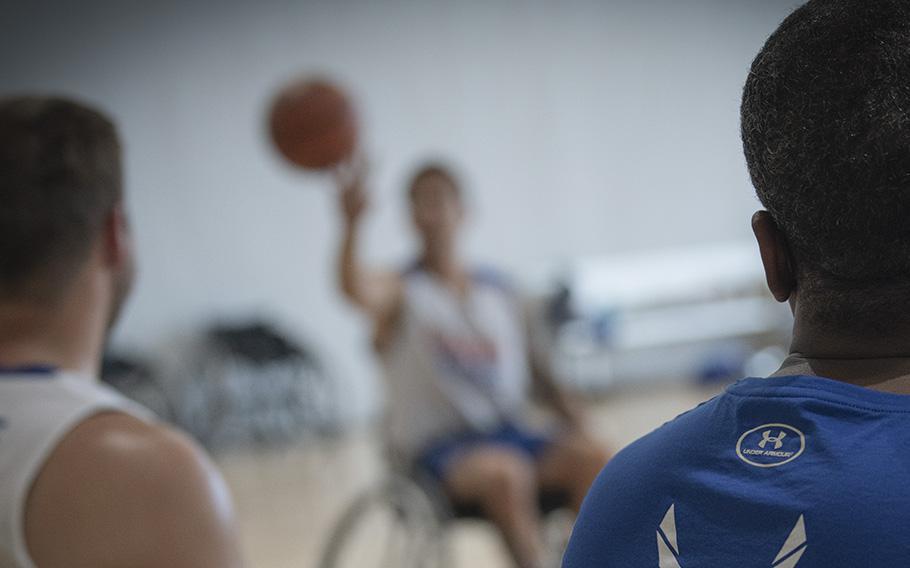
Wheelchair basketball athletes are seen in Ramstein, Germany, on July 23, 2019. (Apolonia Gaspar/Army)
WASHINGTON – Paralyzed veterans seeking disability exams increasingly face long delays to see doctors at the Department of Veterans Affairs and a network of community providers ill-equipped to support their complex health needs, according to House lawmakers.
“Veterans should not face barriers getting exams. The VA must ensure veterans have access to safe and accessible exam facilities,” Rep. Mike Bost, R-Ill., chairman of the House Veterans’ Affairs Committee, said Thursday during a hearing.
The hearing focused on problems paralyzed veterans have accessing care at VA clinics and from private doctors that includes annual medical exams to support disability benefits.
Carl Blake, chief executive officer of Paralyzed Veterans of America, told lawmakers that the VA network of care for paralyzed veterans is “at a breaking point.”
The advocacy group estimates there are staff shortages at one-third of the VA clinics specializing in spinal cord injuries and disorders, he said.
“There is a severe lack of resources for this system of care,” Blake said. “The system is shrinking but the population needing the care is not.”
The VA estimates there are about 42,000 veterans with spinal cord injuries and disorders. About 11% are veterans who served in Iraq and Afghanistan.
Erica Scavella, the VA assistant undersecretary for health clinical services, said the VA is prioritizing hiring more medical staff to care and treat paralyzed veterans at the VA’s 25 specialty clinics that focus exclusively on spinal cord injuries and disorders.
There are 66,000 job vacancies nationwide at VA health care facilities, including for thousands of doctors and registered nurses. The American Board of Physician Specialties has cited the physician shortage at VA hospitals and clinics as impacting quality of care.
The VA’s 2025 budget request is for a workforce of 450,000 at all VA facilities, down by 10,000 from 2024. VA officials have said the reductions largely will come from administrative staff and not from front-line workers.
When veterans cannot get timely medical appointments at the VA clinics or hospitals, they are referred to vendors, which are private doctors in the community. But many of those clinics cannot accommodate paralyzed veterans, according to testimony from the VA Office of Inspector General.
An IG audit in May found more than 100 private vendors under contract with the Veterans Benefits Administration had deficiencies in areas of patient safety, cleanliness and accessibility that included fitting wheelchairs into exam rooms, said Steve Bracci, director of the compensation programs division for the inspector general.
“These deficiencies created needless burdens for veterans with mobility issues and those with spinal cord injuries and disorders,” he said.
Veterans rely on these private facilities for exams to document their disabilities when they apply for benefits and medical services. Veterans receive referrals to the private clinics when care is not readily available at a nearby VA clinic or hospital.
The VA obligated $10 billion for exam contracts from 2017 to 2023, according to the IG audit, which found contract vendors had completed more than eight million exams. The vendors are responsible for scheduling, conducting and documenting exams at non-VA facilities, the audit said.
Bracci cited the VA’s Medical Disability Examination Office for lack of oversight of private vendors under contract with the Veterans Benefits Administration. He said the office does not routinely conduct site visits based on complaints from veterans.
The Medical Disability Examination Office oversees medical disability exams for determining benefits for veterans with spinal cord injuries and disorders.
The IG audit found the Medical Disability Program Office overlooked problems at private health facilities.
“The deficiencies largely went undetected,” Bracci said.
He also said vendors self-certify for compliance with the Americans with Disabilities Act, a federal law that requires facilities must have the physical space and equipment to accommodate and care for people with disabilities.
Rep. Mark Takano, D-Calif., said the VA has a history of providing comprehensive care for paralyzed veterans. He said veterans disproportionately suffer from a higher rate of catastrophic injuries that cause paralysis than the rest of the U.S. population.
“The VA is uniquely positioned as the best provider for this standard of care. But it is necessary to make the continual investments in infrastructure and workforce to provide that lifetime of care,” he said.
Takano said Congress needs to provide the funds necessary for hiring health care workers, upgrading equipment and modernizing VA hospitals and clinics.
The VA expects to spend $383 billion in 2025 to deliver medical care to all veterans, down from an estimated $392 billion in 2024.
Blake echoed Takano’s comments at Thursday’s hearing. He said the 25 VA clinics that specialize in treating spinal cord injuries and disorders bring a level of medical care and an awareness of the needs of paralyzed veterans that is difficult to find elsewhere.
“It’s important that we understand that the VA has a vital role here,” he said. “The system makes care possible for paralyzed veterans. We are pleading with you to put more emphasis behind it.”